广东省金牌中考2016中考英语总复习语法专题课件:专题八 动词的分类(共26张PPT)
文档属性
| 名称 | 广东省金牌中考2016中考英语总复习语法专题课件:专题八 动词的分类(共26张PPT) |
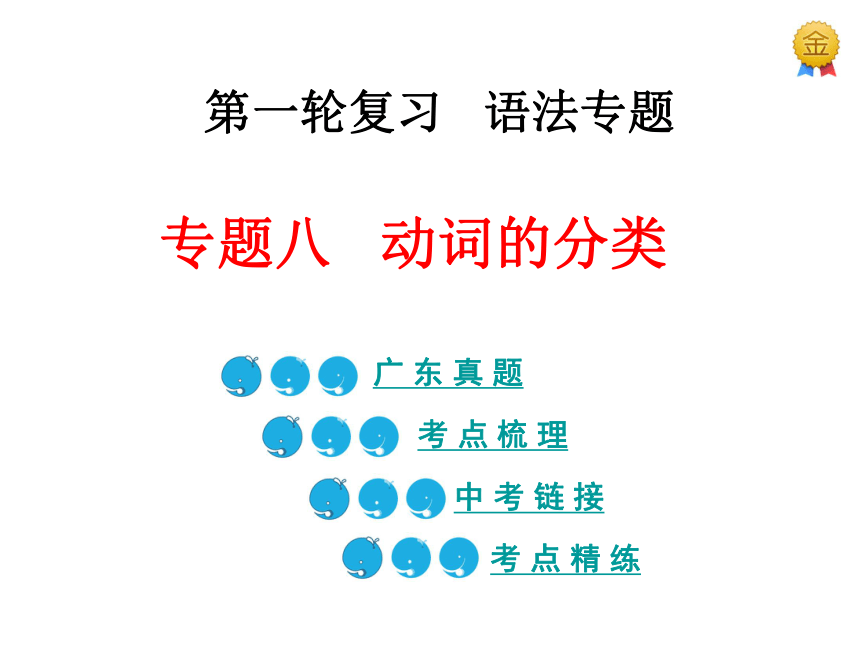
|
|
| 格式 | zip | ||
| 文件大小 | 115.6KB | ||
| 资源类型 | 教案 | ||
| 版本资源 | 通用版 | ||
| 科目 | 英语 | ||
| 更新时间 | 2016-03-12 14:46:31 | ||
图片预览

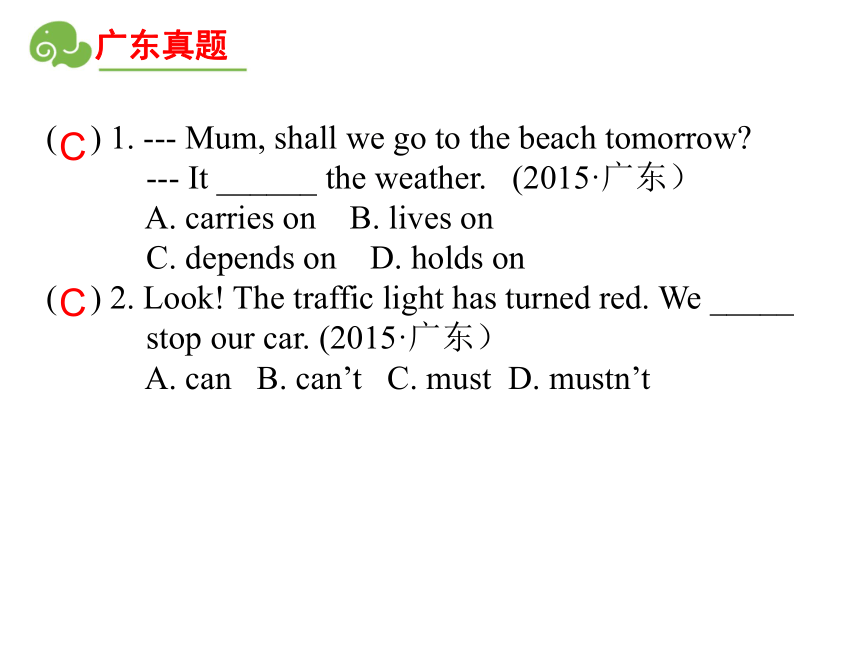
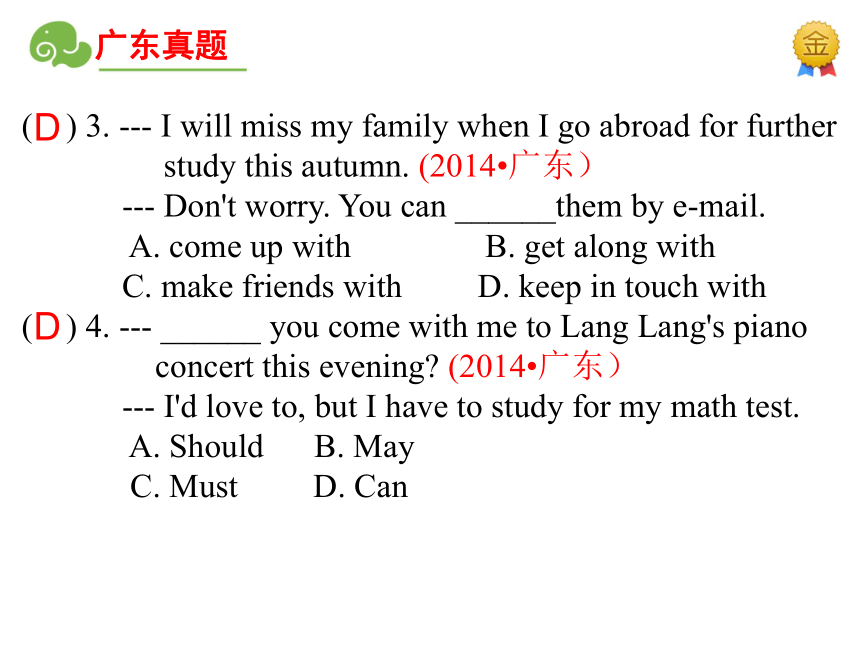
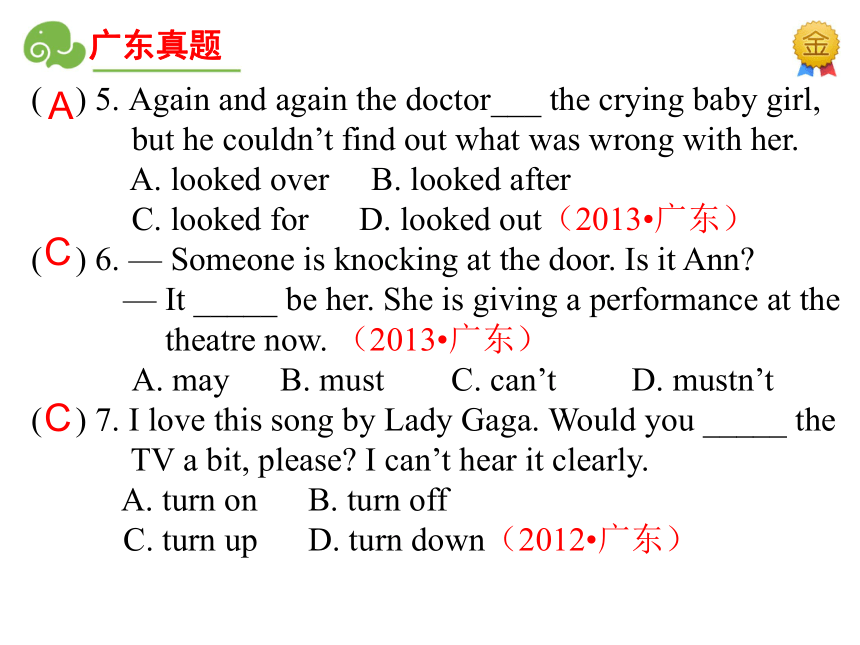
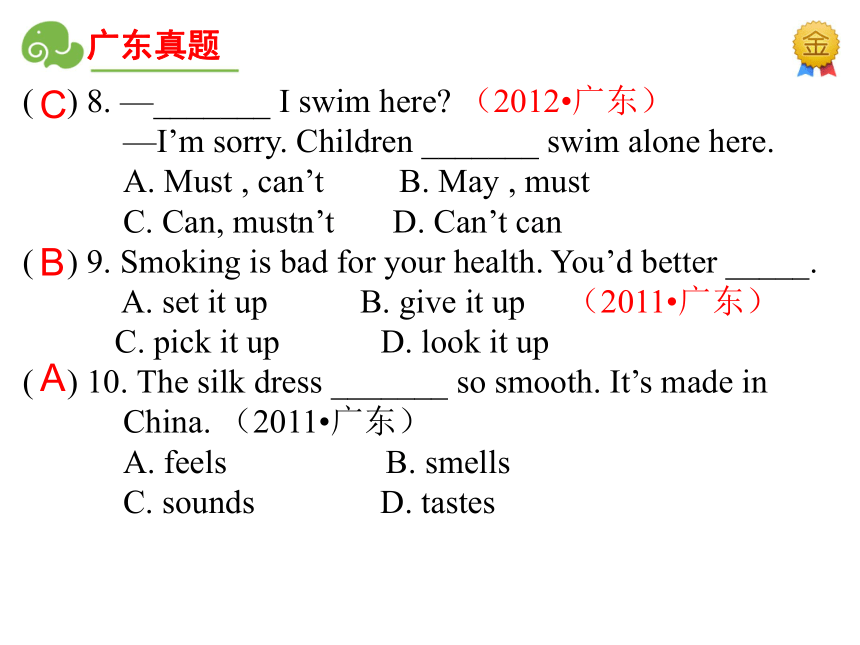
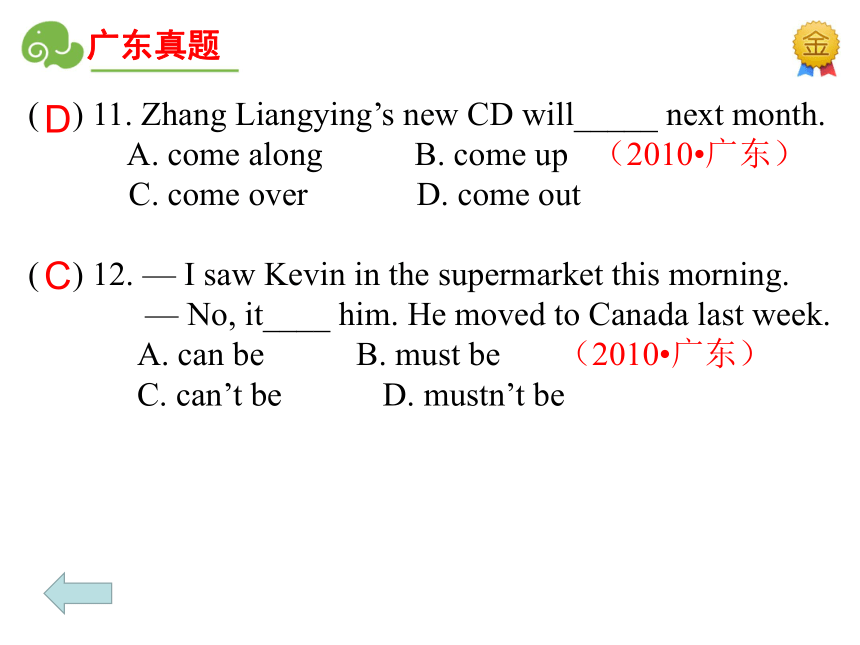
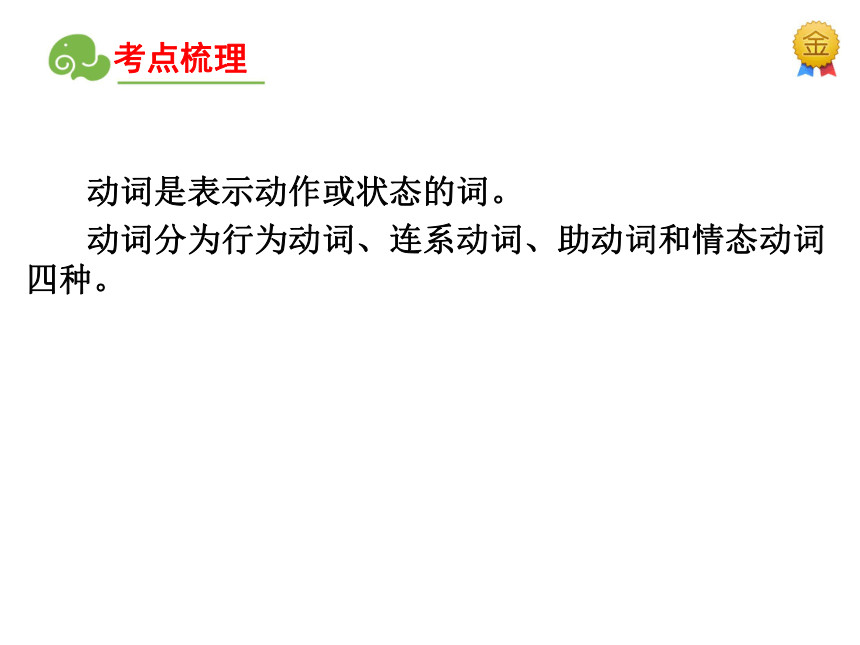
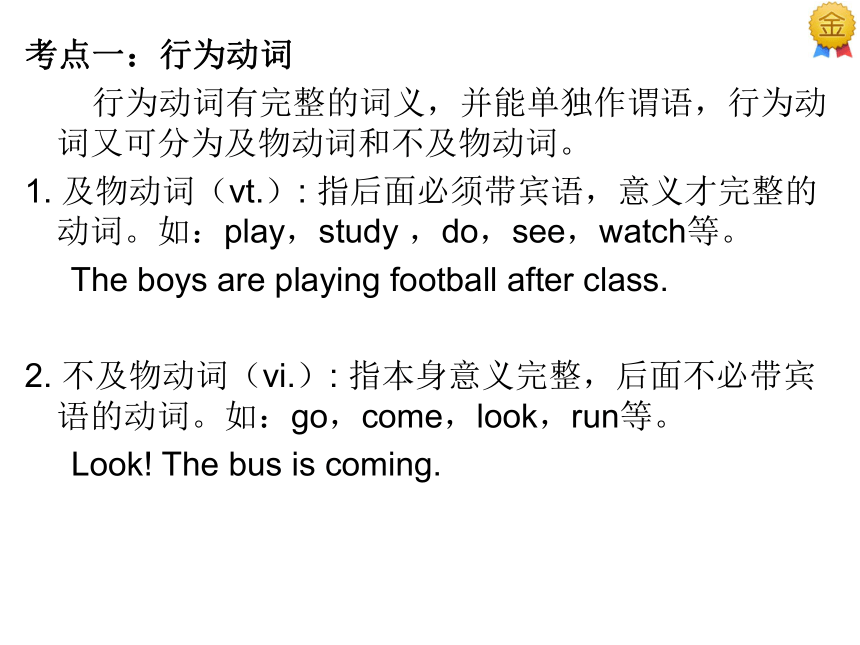
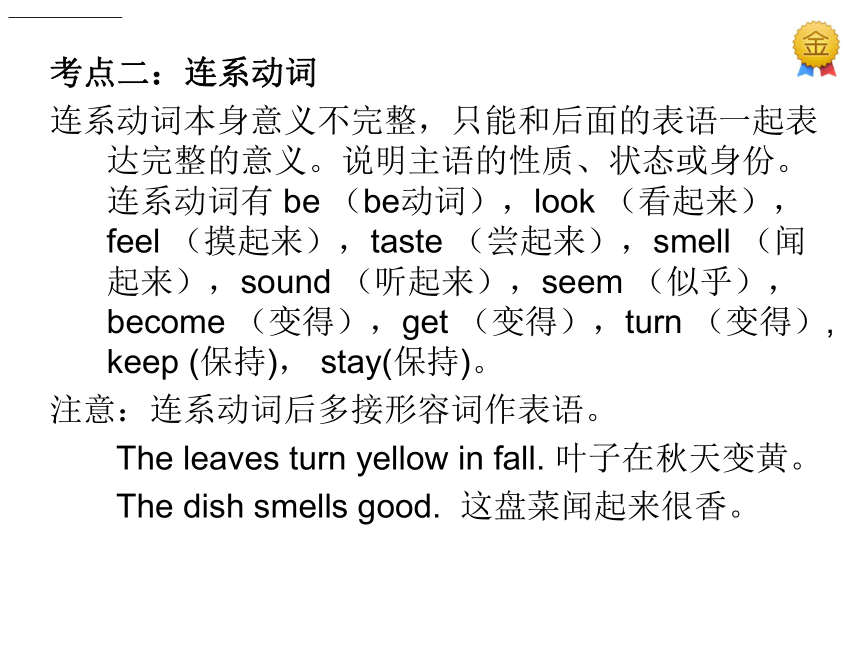
文档简介
课件26张PPT。 第一轮复习 语法专题
专题八 动词的分类( ) 1. --- Mum, shall we go to the beach tomorrow?
--- It ______ the weather. (2015·广东)
A. carries on B. lives on
C. depends on D. holds on
( ) 2. Look! The traffic light has turned red. We _____
stop our car. (2015·广东)
A. can B. can’t C. must D. mustn’t 广东真题CC 广东真题( ) 3. --- I will miss my family when I go abroad for further
study this autumn. (2014?广东)
--- Don't worry. You can ______them by e-mail.
A. come up with B. get along with
C. make friends with D. keep in touch with
( ) 4. --- ______ you come with me to Lang Lang's piano
concert this evening? (2014?广东)
--- I'd love to, but I have to study for my math test.
A. Should B. May
C. Must D. CanDD( ) 5. Again and again the doctor___ the crying baby girl,
but he couldn’t find out what was wrong with her.
A. looked over B. looked after
C. looked for D. looked out(2013?广东)
( ) 6. — Someone is knocking at the door. Is it Ann?
— It _____ be her. She is giving a performance at the
theatre now. (2013?广东)
A. may B. must C. can’t D. mustn’t
( ) 7. I love this song by Lady Gaga. Would you _____ the
TV a bit, please? I can’t hear it clearly.
A. turn on B. turn off
C. turn up D. turn down(2012?广东)
C 广东真题AC( ) 8. —_______ I swim here? (2012?广东)
—I’m sorry. Children _______ swim alone here.
A. Must , can’t B. May , must
C. Can, mustn’t D. Can’t can
( ) 9. Smoking is bad for your health. You’d better _____.
A. set it up B. give it up (2011?广东)
C. pick it up D. look it up
( ) 10. The silk dress _______ so smooth. It’s made in
China. (2011?广东)
A. feels B. smells
C. sounds D. tastesCA 广东真题B( ) 11. Zhang Liangying’s new CD will_____ next month.
A. come along B. come up (2010?广东)
C. come over D. come out
( ) 12. — I saw Kevin in the supermarket this morning.
— No, it____ him. He moved to Canada last week.
A. can be B. must be (2010?广东)
C. can’t be D. mustn’t beDC 广东真题 考点梳理 动词是表示动作或状态的词。
动词分为行为动词、连系动词、助动词和情态动词四种。考点一:行为动词
行为动词有完整的词义,并能单独作谓语,行为动词又可分为及物动词和不及物动词。
1. 及物动词(vt.): 指后面必须带宾语,意义才完整的动词。如:play,study ,do,see,watch等。
The boys are playing football after class.
2. 不及物动词(vi.): 指本身意义完整,后面不必带宾语的动词。如:go,come,look,run等。
Look! The bus is coming.考点二:连系动词
连系动词本身意义不完整,只能和后面的表语一起表达完整的意义。说明主语的性质、状态或身份。连系动词有 be (be动词),look (看起来),feel (摸起来),taste (尝起来),smell (闻起来),sound (听起来),seem (似乎),become (变得),get (变得),turn (变得), keep (保持), stay(保持)。
注意:连系动词后多接形容词作表语。
The leaves turn yellow in fall. 叶子在秋天变黄。
The dish smells good. 这盘菜闻起来很香。 考点三:助动词
助动词本身无意义,不可单独作谓语。它仅仅用来帮助主要动词构成各种时态、语态和语气以及否定和疑问结构。常见的助动词有be,do/does/did,have/has/had,shall/will。
The students are studying hard.
Do you like the TV program?
Have you finished the work?
What shall we do next week? 考点四:情态动词
情态动词本身有意义,但不能独立作谓语,只能和动词原形一起构成谓语,表示能力,义务,必要,猜测等说话人的语气或情态。情态动词没有人称和数的变化。即第三人称单数不加s。 1. can /could
(1) 表示能力;能,会
She can run fast,but I can’t.
can和be able to的区别: can只用于现在时和过去时(could),而be able to可以用于各种时态。
can(could)表示能力时,可用be able to代替。
I can(=am able to)pay for the book. 我买得起那本书。
He will be able to tell you the news soon.
他很快就能告诉你消息了。
She has been able to go to school.
她已经能去学校了。
(3) 表示允许请求。
Can I use this dictionary?
我可以用这本字典吗?
(4) can和could的区别:表能力时,could是can的过去式。表可能,请求允许时,could不是can的过去式,而是表示委婉语气。
He could swim before he went to school.
— Could/ Can you tell me the story?
— Yes,I can.
2. may / might
(1) 表示请求、许可,相当于can,它的否定形式常用can’t/ mustn’t。
May I borrow your pen?
我可以借你的钢笔用一用吗?
(2) 表示可能性或一种推测。might 不是may的过去式,might表示的可能性要比may小。
He might come but it is raining heavily now.
Tomorrow I may go shopping.
明天,我可能去商店买东西。 3. must / have to
(1) must 表示必须。强调说话人的主观意志。此时否定是needn’t.
— Must I do my homework now?
— No,you needn’t. — Yes,you must.
(2) 表示有把握的判断或推测,意思是“一定、准是”,一般只用于肯定句中。否定句中用can’t.
She doesn’t talk with me. She must be angry.
(3) mustn’t表示“禁止,不允许”,语气较强硬。
You mustn’t play football on the street.
It is dangerous. (4) have to 表示来自外界的义务,“不得不,必须”。当主语为第三人称单数时用has to,过去时用had to.
I have to go home now. It’s dark.
(5) must与have to比较: must侧重于个人意志和主观上的必要,have to侧重于客观上的必要。
My brother was very ill,so I had to call the doctor in the middle of the night.
I haven’t got any money with me,so I’ll have to borrow some from my friend.
He said that they must work hard. 4. must,can ,may ,could ,might表示推测的用法。
(1) 表推测的可能性的大小依次是:must — may — could/might — can’t +be /do (一定不是)对现在的状况进行猜测。
No one can answer the question. It must be very difficult.
The book can’t be Tom’s. Look! Lucy’s name is on the cover of the book.
John may come to see us tonight,but he is not very sure yet. (2) 主语+ must,can ,may ,could ,might +be doing. 对现在正在做的事情进行猜测。
They can’t be cleaning the room now. 他们现在不可能在打扫房间。
He must be sleeping . 他现在肯定在睡觉。
(3)主语+ must,can ,may ,could ,might + have +done 则指对过去已发生的事进行推测。
The road is wet,It must have rained last night. 地是湿的,昨天晚上肯定下雨了。
There isn’t any water on the road . It can’t/ couldn’t have rained last night .
地面上一个水滴都没有,昨天不可能下雨了。 5. shall / should
(1) shall 用于第一人称的疑问句,征询听话人的意见、看法或请求指示。
Shall I take you to the hospital? 要不要我带你去医院。
(2) shall 用于第二、三人称时,表允诺、警告、命令等。
You shall do as I say. 你应该照我说的做。
(3) should用于表“义务,应该”。
We should help the poor. 我们应该帮助穷人。 6. need
(1) 作实义动词时,有人称和数的变化。need to do sth 否定为 don’t/doesn’t need to do; need sb. to do sth.; need doing =need to be done
We need to work hard.
We don’t need to go now.
Do I need to clean it now?
(2) 作情态动词,只用于否定句或疑问句。后面直接接动词原形,否定直接在后面加not,一般疑问句直接将need提前。肯定回答时要用must。
We needn’t go there now.
— Need I clean it now? — Yes,you must.
— No,you needn’t/ don’t need to. 7. had better
had better 后接动词原形,表劝告、建议,意思是“最好做某事”。其否定是had better not do.
You’d better see the doctor at once. 你最好立刻去看医生。
You’d better not play in the street. It’s not safe. 你最好不要在街上玩,那不安全。 A B 考点再现 DA考点再现1-5 DBCAC
6-10 CACDA
11-15 ACDCC
16-20 CCDCC 中考链接1-5 CBADB
6-10 ABBCA
11-15 CADCD
16-20 ADDBD 考点精练Thank You!
专题八 动词的分类( ) 1. --- Mum, shall we go to the beach tomorrow?
--- It ______ the weather. (2015·广东)
A. carries on B. lives on
C. depends on D. holds on
( ) 2. Look! The traffic light has turned red. We _____
stop our car. (2015·广东)
A. can B. can’t C. must D. mustn’t 广东真题CC 广东真题( ) 3. --- I will miss my family when I go abroad for further
study this autumn. (2014?广东)
--- Don't worry. You can ______them by e-mail.
A. come up with B. get along with
C. make friends with D. keep in touch with
( ) 4. --- ______ you come with me to Lang Lang's piano
concert this evening? (2014?广东)
--- I'd love to, but I have to study for my math test.
A. Should B. May
C. Must D. CanDD( ) 5. Again and again the doctor___ the crying baby girl,
but he couldn’t find out what was wrong with her.
A. looked over B. looked after
C. looked for D. looked out(2013?广东)
( ) 6. — Someone is knocking at the door. Is it Ann?
— It _____ be her. She is giving a performance at the
theatre now. (2013?广东)
A. may B. must C. can’t D. mustn’t
( ) 7. I love this song by Lady Gaga. Would you _____ the
TV a bit, please? I can’t hear it clearly.
A. turn on B. turn off
C. turn up D. turn down(2012?广东)
C 广东真题AC( ) 8. —_______ I swim here? (2012?广东)
—I’m sorry. Children _______ swim alone here.
A. Must , can’t B. May , must
C. Can, mustn’t D. Can’t can
( ) 9. Smoking is bad for your health. You’d better _____.
A. set it up B. give it up (2011?广东)
C. pick it up D. look it up
( ) 10. The silk dress _______ so smooth. It’s made in
China. (2011?广东)
A. feels B. smells
C. sounds D. tastesCA 广东真题B( ) 11. Zhang Liangying’s new CD will_____ next month.
A. come along B. come up (2010?广东)
C. come over D. come out
( ) 12. — I saw Kevin in the supermarket this morning.
— No, it____ him. He moved to Canada last week.
A. can be B. must be (2010?广东)
C. can’t be D. mustn’t beDC 广东真题 考点梳理 动词是表示动作或状态的词。
动词分为行为动词、连系动词、助动词和情态动词四种。考点一:行为动词
行为动词有完整的词义,并能单独作谓语,行为动词又可分为及物动词和不及物动词。
1. 及物动词(vt.): 指后面必须带宾语,意义才完整的动词。如:play,study ,do,see,watch等。
The boys are playing football after class.
2. 不及物动词(vi.): 指本身意义完整,后面不必带宾语的动词。如:go,come,look,run等。
Look! The bus is coming.考点二:连系动词
连系动词本身意义不完整,只能和后面的表语一起表达完整的意义。说明主语的性质、状态或身份。连系动词有 be (be动词),look (看起来),feel (摸起来),taste (尝起来),smell (闻起来),sound (听起来),seem (似乎),become (变得),get (变得),turn (变得), keep (保持), stay(保持)。
注意:连系动词后多接形容词作表语。
The leaves turn yellow in fall. 叶子在秋天变黄。
The dish smells good. 这盘菜闻起来很香。 考点三:助动词
助动词本身无意义,不可单独作谓语。它仅仅用来帮助主要动词构成各种时态、语态和语气以及否定和疑问结构。常见的助动词有be,do/does/did,have/has/had,shall/will。
The students are studying hard.
Do you like the TV program?
Have you finished the work?
What shall we do next week? 考点四:情态动词
情态动词本身有意义,但不能独立作谓语,只能和动词原形一起构成谓语,表示能力,义务,必要,猜测等说话人的语气或情态。情态动词没有人称和数的变化。即第三人称单数不加s。 1. can /could
(1) 表示能力;能,会
She can run fast,but I can’t.
can和be able to的区别: can只用于现在时和过去时(could),而be able to可以用于各种时态。
can(could)表示能力时,可用be able to代替。
I can(=am able to)pay for the book. 我买得起那本书。
He will be able to tell you the news soon.
他很快就能告诉你消息了。
She has been able to go to school.
她已经能去学校了。
(3) 表示允许请求。
Can I use this dictionary?
我可以用这本字典吗?
(4) can和could的区别:表能力时,could是can的过去式。表可能,请求允许时,could不是can的过去式,而是表示委婉语气。
He could swim before he went to school.
— Could/ Can you tell me the story?
— Yes,I can.
2. may / might
(1) 表示请求、许可,相当于can,它的否定形式常用can’t/ mustn’t。
May I borrow your pen?
我可以借你的钢笔用一用吗?
(2) 表示可能性或一种推测。might 不是may的过去式,might表示的可能性要比may小。
He might come but it is raining heavily now.
Tomorrow I may go shopping.
明天,我可能去商店买东西。 3. must / have to
(1) must 表示必须。强调说话人的主观意志。此时否定是needn’t.
— Must I do my homework now?
— No,you needn’t. — Yes,you must.
(2) 表示有把握的判断或推测,意思是“一定、准是”,一般只用于肯定句中。否定句中用can’t.
She doesn’t talk with me. She must be angry.
(3) mustn’t表示“禁止,不允许”,语气较强硬。
You mustn’t play football on the street.
It is dangerous. (4) have to 表示来自外界的义务,“不得不,必须”。当主语为第三人称单数时用has to,过去时用had to.
I have to go home now. It’s dark.
(5) must与have to比较: must侧重于个人意志和主观上的必要,have to侧重于客观上的必要。
My brother was very ill,so I had to call the doctor in the middle of the night.
I haven’t got any money with me,so I’ll have to borrow some from my friend.
He said that they must work hard. 4. must,can ,may ,could ,might表示推测的用法。
(1) 表推测的可能性的大小依次是:must — may — could/might — can’t +be /do (一定不是)对现在的状况进行猜测。
No one can answer the question. It must be very difficult.
The book can’t be Tom’s. Look! Lucy’s name is on the cover of the book.
John may come to see us tonight,but he is not very sure yet. (2) 主语+ must,can ,may ,could ,might +be doing. 对现在正在做的事情进行猜测。
They can’t be cleaning the room now. 他们现在不可能在打扫房间。
He must be sleeping . 他现在肯定在睡觉。
(3)主语+ must,can ,may ,could ,might + have +done 则指对过去已发生的事进行推测。
The road is wet,It must have rained last night. 地是湿的,昨天晚上肯定下雨了。
There isn’t any water on the road . It can’t/ couldn’t have rained last night .
地面上一个水滴都没有,昨天不可能下雨了。 5. shall / should
(1) shall 用于第一人称的疑问句,征询听话人的意见、看法或请求指示。
Shall I take you to the hospital? 要不要我带你去医院。
(2) shall 用于第二、三人称时,表允诺、警告、命令等。
You shall do as I say. 你应该照我说的做。
(3) should用于表“义务,应该”。
We should help the poor. 我们应该帮助穷人。 6. need
(1) 作实义动词时,有人称和数的变化。need to do sth 否定为 don’t/doesn’t need to do; need sb. to do sth.; need doing =need to be done
We need to work hard.
We don’t need to go now.
Do I need to clean it now?
(2) 作情态动词,只用于否定句或疑问句。后面直接接动词原形,否定直接在后面加not,一般疑问句直接将need提前。肯定回答时要用must。
We needn’t go there now.
— Need I clean it now? — Yes,you must.
— No,you needn’t/ don’t need to. 7. had better
had better 后接动词原形,表劝告、建议,意思是“最好做某事”。其否定是had better not do.
You’d better see the doctor at once. 你最好立刻去看医生。
You’d better not play in the street. It’s not safe. 你最好不要在街上玩,那不安全。 A B 考点再现 DA考点再现1-5 DBCAC
6-10 CACDA
11-15 ACDCC
16-20 CCDCC 中考链接1-5 CBADB
6-10 ABBCA
11-15 CADCD
16-20 ADDBD 考点精练Thank You!
同课章节目录
- 词法
- 名词
- 动词和动词短语
- 动词语态
- 动词时态
- 助动词和情态动词
- 非谓语动词
- 冠词
- 代词
- 数词和量词
- 形容词副词及其比较等级
- 介词和介词短语
- 连词和感叹词
- 构词法
- 相似、相近词比较
- 句法
- 陈述句
- 一般疑问句和否定疑问句
- 特殊疑问句及选择疑问句
- 反意疑问句
- 存在句(There be句型)
- 宾语从句
- 定语从句
- 状语从句
- 主谓一致问题
- 简单句
- 并列句
- 复合句
- 主谓一致
- 主、表语从句
- 名词性从句
- 直接引语和间接引语
- 虚拟语气
- 感叹句
- 强调句
- 倒装句
- 祈使句
- 句子的成分
- 句子的分类
- 题型专区
- 单项选择部分
- 易错题
- 完形填空
- 阅读理解
- 词汇练习
- 听说训练
- 句型转换
- 补全对话
- 短文改错
- 翻译
- 书面表达
- 任务型阅读
- 语法填空
- 其他资料
